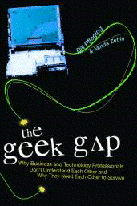Dreams of Free WiFi Evaporate?
Years ago, after we spent a lovely afternoon catching up on our e-mail in Bryant Park in Midtown Manhattan, Bill proposed something called Wireless Woodstock, to broadcast WiFi throughout the village of Woodstock (which amounts to about four city blocks) and perhaps beyond.
Who would pay for it? Bill and others proposed various options, including support by advertising on the welcome page, or having a slower free service and faster pay service. But none of these things ever quite materialized. I always thought Wireless Woodstock was something of a Geek Gap victim: Bill had a great idea but lacked the suits skills of writing a business plan or marketing the idea to local businesses or governments enough to get it off the ground.
It may also have been too early to make that proposal: at the time there were no businesses in town that offered WiFi (now there are at least two, plus the library) and most people had not yet tumbled to how useful wireless can be. Woodstock would have been the first village in the U.S. to offer wireless everywhere.
Five years or so later, WirelessWoodstock is still on permanent hold, but other, much larger cities have started--or tried to start--much more massive free-wireless projects. And fallen victim to the Geek Gap in their own right.
In Philadelphia, a plan to provide free municipal wireless (especially to lower-income residents, along with some training) morphed into a low-cost plan after business interests forcefully attacked the offering as competing unfairly with their offerings.
Now comes the disheartening news that San Francisco, long expected to be a model for free Wi-Fi, is pusing back a controversial and much-delayed vote on a free (lower speed and pay higher speed) wireless plan because of hesitation from Earthlink, which was to have provided the service. San Francisco's plan ran into a host of objections based on privacy, health, the environment--you name it. It's hard not to suspect, though, that corporate interests providing Internet for pay might be behind some of the fuss.
It was a beautiful dream, wasn't it? You're in any large city in America, and you pop out your laptop or your PDA and right there, right then, you're online. No credit cards to enter, no monthly fee. Pretty soon, you won't even think about it, you'll just assume the Internet will always be there, no matter where you are, the very second you want it.
I still believe someday it will still come true.
Who would pay for it? Bill and others proposed various options, including support by advertising on the welcome page, or having a slower free service and faster pay service. But none of these things ever quite materialized. I always thought Wireless Woodstock was something of a Geek Gap victim: Bill had a great idea but lacked the suits skills of writing a business plan or marketing the idea to local businesses or governments enough to get it off the ground.
It may also have been too early to make that proposal: at the time there were no businesses in town that offered WiFi (now there are at least two, plus the library) and most people had not yet tumbled to how useful wireless can be. Woodstock would have been the first village in the U.S. to offer wireless everywhere.
Five years or so later, WirelessWoodstock is still on permanent hold, but other, much larger cities have started--or tried to start--much more massive free-wireless projects. And fallen victim to the Geek Gap in their own right.
In Philadelphia, a plan to provide free municipal wireless (especially to lower-income residents, along with some training) morphed into a low-cost plan after business interests forcefully attacked the offering as competing unfairly with their offerings.
Now comes the disheartening news that San Francisco, long expected to be a model for free Wi-Fi, is pusing back a controversial and much-delayed vote on a free (lower speed and pay higher speed) wireless plan because of hesitation from Earthlink, which was to have provided the service. San Francisco's plan ran into a host of objections based on privacy, health, the environment--you name it. It's hard not to suspect, though, that corporate interests providing Internet for pay might be behind some of the fuss.
It was a beautiful dream, wasn't it? You're in any large city in America, and you pop out your laptop or your PDA and right there, right then, you're online. No credit cards to enter, no monthly fee. Pretty soon, you won't even think about it, you'll just assume the Internet will always be there, no matter where you are, the very second you want it.
I still believe someday it will still come true.



0 Comments:
Post a Comment
Subscribe to Post Comments [Atom]
<< Home